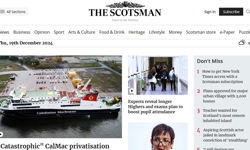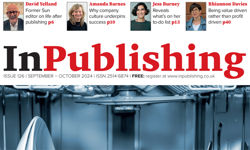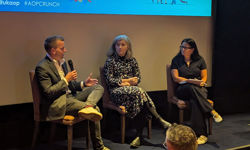
On boring Mondays when nothing much is happening and the news editor is behaving in a particularly unreasonable manner, many must have had the daydream.
Come up with a journalistic idea that allows you to become your own boss, that also makes you a multi-millionaire. Then, later, that in turn gives you the freedom to run your own little pro bono outfit that robustly rebuts false information in the media and elsewhere on the greatest challenge the UK has faced for decades – the EU referendum and Brexit.
If such a thing is anyone’s dream, then former Financial Times journalist Hugo Dixon made his a reality. First, there was the creation of the online analysis service, Breakingviews, sold to Reuters for around £12 million.
As the pledge to hold a referendum on EU membership became inevitable with the Conservative victory in the last election, InFacts was set up to hold both sides to account and Dixon plans to pursue circumlocutions and falsehoods right to the final edge of leaving the European Union, whenever it happens.
Lightbulb moment
It was dot com time just before the millennium when Dixon, then head of Lex, the FT’s highly regarded financial and business comment section, flew to Seattle to interview Bill Gates, the Microsoft founder.
But it was over a coffee with Michael Kinsley, editor of Slate, the new Gates online magazine – rather than Gates himself - that helped give Dixon the key insight that changed the course of his life.
“It seemed to me that if we were going to be able to do this internet thing with politics and current affairs, how much more would you be able to do it with finance,” says Dixon.
Readers didn’t get Lex, with its possibly market-moving judgments and reviews of company results, until the next morning. What if you could provide something as good, or even better, by lunchtime the same day? There would be people, Dixon mused, who would be willing to pay for such immediacy.
“I decided to go for it. It was risky; the internet was nowhere near where it is today, but when we raised our first $1 million, that gave me the confidence to do it under the radar,” says Dixon who wasn’t quite frog-marched off the FT premises for setting up a partial rival, but was certainly required to clear his desk promptly.
When Reuters bought Breakingviews in 2009, Dixon’s shares and options were worth about £3 million although he continued to edit Breakingviews until 2012.
Fact-based
Dixon, who is 53, still writes columns for his old creation but is now largely consumed with InFacts where he is chairman, editor-in-chief and a prolific commentator.
He describes himself as a “fact-based” remainer, and his most recent book is, The In/Out Question: Why Britain Should Stay in the EU and Fight to Make it Better.
The origins of InFacts came when Hugo Dixon set up a meeting of senior journalists in his house soon after the 2015 election. Perhaps they should have a discussion group and swap ideas on the coming referendum.
One of those there, Will Hutton, former editor-in-chief of The Observer now master of Hereford College, Oxford, suggested instead setting up a funky website focused on the referendum and based on facts and the best factual analysis.
“I went and did it and Will is still involved,” says Dixon. Apart from Hutton, the editorial board includes journalists such as Geert Linnebank, former editor-in-chief of Reuters, Anne Applebaum, the Pulitzer prize winning American journalist and author, and David Yelland, former editor of The Sun.
More than £300,000 was raised both from the editors and outside contributors, to pay for three smart young journalists and a marketing effort to help reach, to begin with, media and political professions.
“Apart from analysis, we had short, sharp, hard-hitting stories and we discovered there was also a retail audience and the retail audience was basically a Facebook audience,” says Dixon.
One of their mini-animations got nearly four million views on Facebook.
Even-handed
Although those behind InFacts are remainers of various hues, Dixon insists InFacts tackles misleading information whatever the source.
InFacts criticised the CBI for claiming that British households are £3,000 a year better off from being in the EU – a number that was seen as spuriously precise and apparently based on a conclusion that the net benefit to the UK of EU membership was somewhere between 1 per cent and 9.5 per cent of gross domestic product. A middle point was taken and divided by the number of households.
InFacts also didn’t like the argument from Downing Street that if the Calais refugee camp was closed because of Brexit, the camp would somehow move to Kent.
“On the leave side, there were so many inaccurate and misleading statements, we had a section called Mythbust and we had about 100 different myths that we busted,” says Dixon.
By now, most of Dixon’s “five most misleading myths” are rather familiar. They range from Turkey to join the EU in 2020 and the notorious £350 million a week that allegedly goes to Brussels that would be used to save the NHS.
Dixon is also amused by the claim that the EU needs us more than we need it – the Germans wanting to sell their BMW line - and by the notion that we always get outvoted in Brussels.
InFacts pointed out that UK exports to the EU accounted for 13 per cent of our economy while their exports to us are only 3 per cent of their economy.
As for being out-voted, since 1999, the UK, Dixon points out with the help of LSE research, has been on the losing side in the EU Council 56 times – but on the winning side, 2,466 times.
Seeking redress
During the campaign, InFacts made direct complaints to newspapers seeking corrections and around twenty formal complaints about newspaper coverage to the Independent Press Standards Organisation (IPSO). Some were rejected, a number upheld.
IPSO found that a Daily Mail front-page headline in June about illegal immigrants: “We’re From Europe Let Us In” breached the editor’s code.
The illegals were from Iraq and Kuwait, although IPSO took no action because the Daily Mail promptly corrected the error.
Dixon is still particularly exercised about how IPSO handled an InFacts complaint against The Sun for a front page splash a month before the referendum with the headline “Brits Not Fair” claiming that four in five jobs go to foreigners. The Sun story, which it refused to correct, was based on statistics from the Office of National Statistics.
The ONS had warned that the number of people entering or leaving employment are larger than the net changes and therefore cannot be used to estimate the proportion of new jobs that have been filled by UK and non-UK workers.
The adjudication came in November and IPSO ruled that a small page 2 correction was “sufficiently prominent” because the main offending graphic had appeared there rather than on the front page.
“The basic problem we found with IPSO, apart from the fact we disagreed with their view on some particular stories, is that even when we have won, it has taken a long time and the corrections haven’t been sufficiently prominent,” says the InFacts chairman.
BBC – too soft
Dixon is also critical of BBC coverage but not necessarily for the most commonly cited reason, that the Corporation stuck too doggedly to a rigid interpretation of impartiality.
“There is an even bigger criticism, the BBC’s failure to be rigorous enough in challenging what was being said. The BBC was just too soft. There were some fantastic exceptions like Andrew Neil who always grilled everybody whatever their side,” says Dixon.
In the referendum, the InFacts view of the world did not carry the day so what next – if anything. The battle goes on.
Dixon and his editorial board are close to finalising enough finance to keep going through this year and probably beyond.
“We still think we have a role to play during the Brexit process of two and a half years or whatever it is, and we still think there is a need to get the facts straight and hold the Brexit newspapers to account for their inaccuracies and also Brexiteers and the Government,” he says.
Dixon believes it is unlikely, but still possible, that if enough people change their minds on Brexit by 2018, pressure might mount on Prime Minister Theresa May to say, “enough is enough, let’s stop this craziness”.
The aim of InFacts is to continue to provide what it sees as intellectual leadership where they think they can, “to make a facts-based case for staying in the EU, or failing that, maintaining strong relations between Britain and the EU.”
Might he consider moving on to checking a wider range of non-Brexit facts?
The thought has flitted across Hugo Dixon’s mind but there are no plans to do so at the moment because he believes the tiny outfit will have its hands full with Brexit for the foreseeable future.
He is also involved with Common Ground, a campaigning organisation designed to try to pull the country together again when other political forces are pulling it apart.
Common Ground, Dixon concedes, hasn’t yet figured out how to do that other than visiting ten towns, which voted strongly for Brexit, to assess how they see themselves, strengths and weaknesses.
But back on the journalistic battlefields where, increasingly, online half-truths and outright fake stories are a growing problem, what can be done?
“All one can do is engage with the enemy. It’s not enough to throw up one’s hands and say how terrible it is. One needs to get involved in the debates online and push our accurate content and try to inject it into parts of the internet that other facts don’t reach,” insists Hugo Dixon, editor-in-chief of InFacts.












